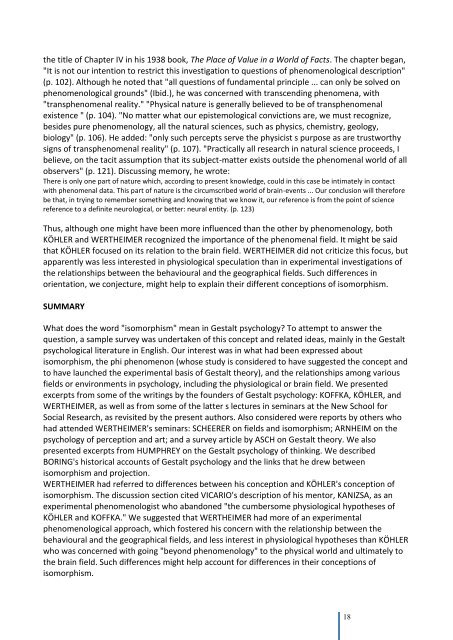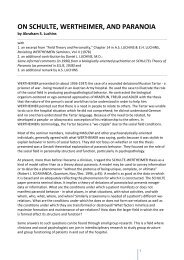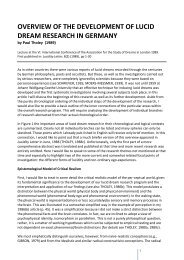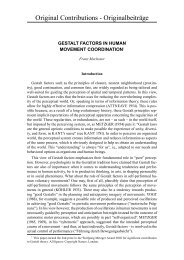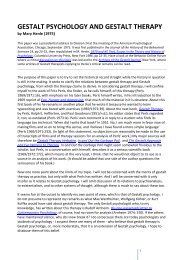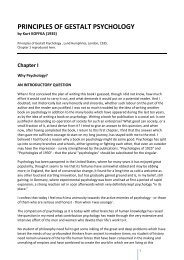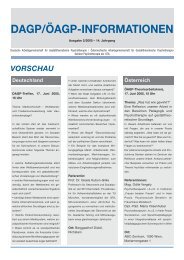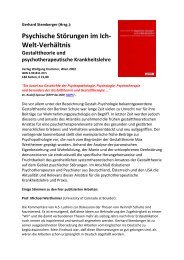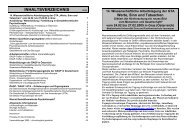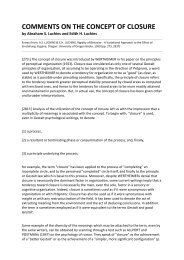pdf-Download - Society for Gestalt Theory and its Applications (GTA)
pdf-Download - Society for Gestalt Theory and its Applications (GTA)
pdf-Download - Society for Gestalt Theory and its Applications (GTA)
You also want an ePaper? Increase the reach of your titles
YUMPU automatically turns print PDFs into web optimized ePapers that Google loves.
the title of Chapter IV in his 1938 book, The Place of Value in a World of Facts. The chapter began,"It is not our intention to restrict this investigation to questions of phenomenological description"(p. 102). Although he noted that "all questions of fundamental principle ... can only be solved onphenomenological grounds" (Ibid.), he was concerned with transcending phenomena, with"transphenomenal reality." "Physical nature is generally believed to be of transphenomenalexistence " (p. 104). "No matter what our epistemological convictions are, we must recognize,besides pure phenomenology, all the natural sciences, such as physics, chemistry, geology,biology" (p. 106). He added: "only such percepts serve the physicist s purpose as are trustworthysigns of transphenomenal reality" (p. 107). "Practically all research in natural science proceeds, Ibelieve, on the tacit assumption that <strong>its</strong> subject-matter exists outside the phenomenal world of allobservers" (p. 121). Discussing memory, he wrote:There is only one part of nature which, according to present knowledge, could in this case be intimately in contactwith phenomenal data. This part of nature is the circumscribed world of brain-events ... Our conclusion will there<strong>for</strong>ebe that, in trying to remember something <strong>and</strong> knowing that we know it, our reference is from the point of sciencereference to a definite neurological, or better: neural entity. (p. 123)Thus, although one might have been more influenced than the other by phenomenology, bothKÖHLER <strong>and</strong> WERTHEIMER recognized the importance of the phenomenal field. It might be saidthat KÖHLER focused on <strong>its</strong> relation to the brain field. WERTHEIMER did not criticize this focus, butapparently was less interested in physiological speculation than in experimental investigations ofthe relationships between the behavioural <strong>and</strong> the geographical fields. Such differences inorientation, we conjecture, might help to explain their different conceptions of isomorphism.SUMMARYWhat does the word "isomorphism" mean in <strong>Gestalt</strong> psychology? To attempt to answer thequestion, a sample survey was undertaken of this concept <strong>and</strong> related ideas, mainly in the <strong>Gestalt</strong>psychological literature in English. Our interest was in what had been expressed aboutisomorphism, the phi phenomenon (whose study is considered to have suggested the concept <strong>and</strong>to have launched the experimental basis of <strong>Gestalt</strong> theory), <strong>and</strong> the relationships among variousfields or environments in psychology, including the physiological or brain field. We presentedexcerpts from some of the writings by the founders of <strong>Gestalt</strong> psychology: KOFFKA, KÖHLER, <strong>and</strong>WERTHEIMER, as well as from some of the latter s lectures in seminars at the New School <strong>for</strong>Social Research, as revisited by the present authors. Also considered were reports by others whohad attended WERTHEIMER's seminars: SCHEERER on fields <strong>and</strong> isomorphism; ARNHEIM on thepsychology of perception <strong>and</strong> art; <strong>and</strong> a survey article by ASCH on <strong>Gestalt</strong> theory. We alsopresented excerpts from HUMPHREY on the <strong>Gestalt</strong> psychology of thinking. We describedBORING's historical accounts of <strong>Gestalt</strong> psychology <strong>and</strong> the links that he drew betweenisomorphism <strong>and</strong> projection.WERTHEIMER had referred to differences between his conception <strong>and</strong> KÖHLER's conception ofisomorphism. The discussion section cited VICARIO's description of his mentor, KANIZSA, as anexperimental phenomenologist who ab<strong>and</strong>oned "the cumbersome physiological hypotheses ofKÖHLER <strong>and</strong> KOFFKA." We suggested that WERTHEIMER had more of an experimentalphenomenological approach, which fostered his concern with the relationship between thebehavioural <strong>and</strong> the geographical fields, <strong>and</strong> less interest in physiological hypotheses than KÖHLERwho was concerned with going "beyond phenomenology" to the physical world <strong>and</strong> ultimately tothe brain field. Such differences might help account <strong>for</strong> differences in their conceptions ofisomorphism.18


